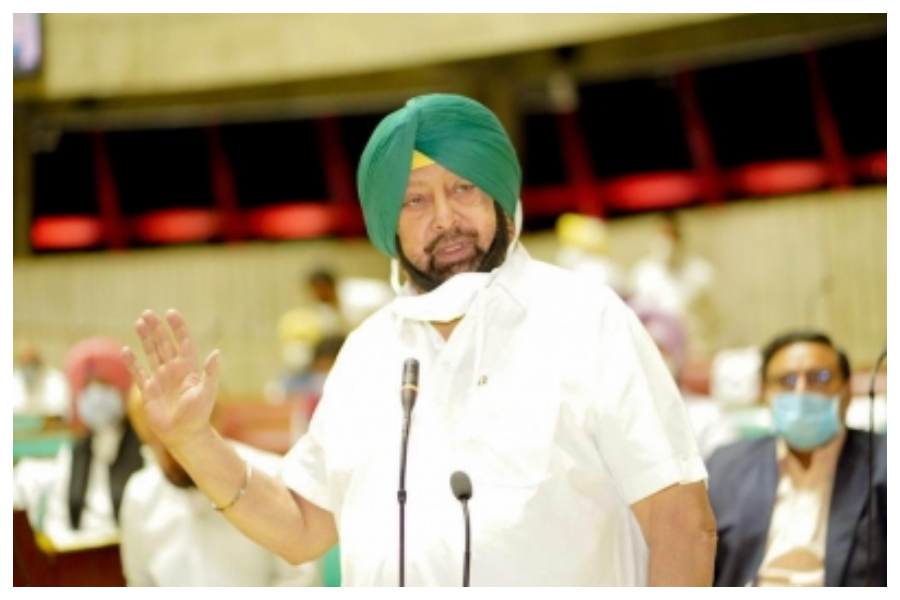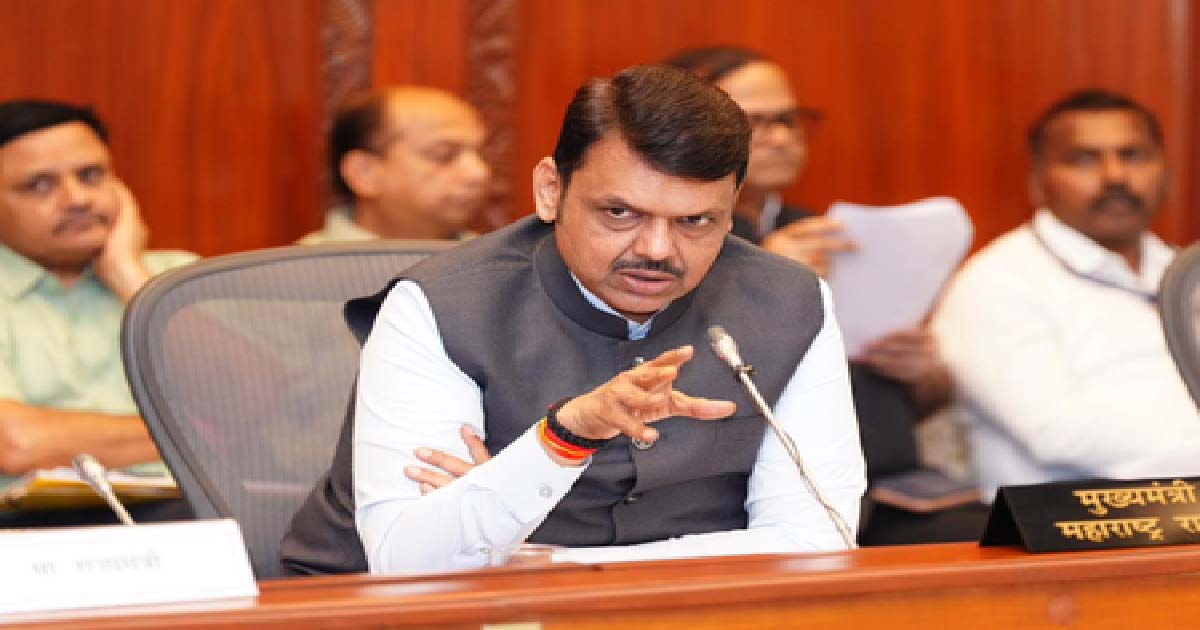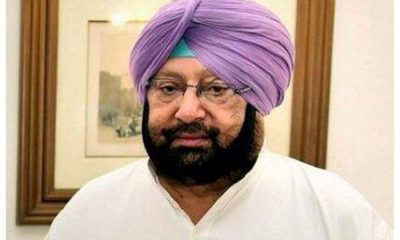National News
Will not retire till Punjab rid of corrupt politicians: Amarinder

Launching yet another scathing attack on the Congress over the nomination of Charanjit Singh Channi as chief ministerial candidate even after his kin was “caught with mafia earnings”, Punjab Lok Congress (PLC) chief Capt Amarinder Singh on Thursday declared that he will not retire till he will get the state rid of such corrupt people.
The former Chief Minister expressed surprise at his former party, the Congress, fielding all MLAs involved with the sand mining mafia as candidates in these Assembly polls and termed it a clear endorsement of widespread corruption in the party.
Stating that he had decided to ally with the BJP and continue to work for Punjab, in the interest of its peace and security, Amarinder expressed concern over the threat from across the border as well as the recent sacrilege incidents in the state.
“We will not let the social fabric of Punjab be destroyed,” said Amarinder, terming the recent spate of sacrilege incidents in the state, including at Darbar Sahib and a Patiala temple, as unfortunate and aimed at dividing the society.
Addressing a series of public meetings in support of PLC and BJP candidates from Sanaur and Banur towns, Amarinder pointed out that Channi’s nephew, arrested by the Enforcement Directorate, had reportedly admitted that the Rs 10 crore seized from his possession was earned from illegal sand minings as well as transfers and postings. “How can Channi then claim to be a poor aam aadmi!” he said.
Asserting that he planned to continue fighting for Punjab and the nation, the PLC chief said with security paramount for the border state, his party’s alliance with the BJP would help fulfill their collective responsibility to make India secure.
“We have to save ourselves from our enemies from across the border and not let people like Navjot Sidhu, who had been going around the Pakistani Army chief, compromise our security,” he stressed.
Punjab also needs the Central government’s support for its economic revival, which the PLC-BJP-SAD Sanyukt alliance would help achieve, said Amarinder, noting that the state has no money for development, which will remain a far cry under the false promises of parties like Congress, AAP and SAD, who were not willing to work in coordination with the Centre.
In New Mohindra Colony, where he was campaigning for Sanaur PLC candidate Bikramjit Singh Chahal, Amarinder recalled his close ties with the area, pointing out that he had contested his first election from Dakala in 1980, and earlier, his father had also contested from this parliamentary constituency.
Chahal, in his address, promised all-round development of the constituency if elected and said he will continue the social work he had been engaged in for a long time.
The PLC chief later sought votes for BJP candidate from Rajpura, Jagdish Kumar Jaggar, in Banur, on the plank of development, which he said the incumbent Channi government was falsely claiming credit to under the guise of the projects he had initiated during his tenure.
Crime
Ulhasnagar Woman Harassed in Divyang Coach Of Mumbai Local Train; 2 Arrested

Kalyan: In a shocking incident, a 26-year-old woman from Ulhasnagar was allegedly harassed in the Divyang coach of a Mumbai local train on December 2. The incident occurred on Tuesday, December 2, at around 8.15 pm.
In the video shared by, while returning from work in Thane, she boarded the Central Railways Thane-Kalyan train. After the train crossed Dombivali, the woman argued with the accused, identified as Anup Surendra Singh, and Abhilasha Arjun Nayar regarding the Divyang pass. The woman alleged that after she had a heated argument, the two accused caught her hand and even eve-teased her.
When they got down at Ulhasnagar station, all three, along with another eyewitness, had a huge argument at the station. Railway Police soon reached the platform, where several women intervened and confronted the officers about the incident. The police then later moved the accused to the Kalyan Railway Police Station, and based on the woman’s complaint, a case was registered under Section 74 of the Bharatiya Nyaya Sanhita (BNS). Both the accused have been arrested.
Meanwhile, last month, a 25-year-old transgender person was arrested by the Vashi Government Railway Police (GRP) for allegedly molesting a 28-year-old woman aboard a Panvel to CSMT local train on 2 November. The incident occurred around 12.10 pm when the train was nearing Nerul station. The accused, when he boarded the general compartment of the harbour line train, was seeking alms from passengers. When the train crossed Seawoods station, an argument broke out between the accused and a male passenger who refused to give money.
The man, accompanied by a female friend, asked the accused to move ahead, leading to a heated verbal exchange. During the confrontation, the accused allegedly abused the man and touched the woman on her shoulder, which made her uncomfortable. A complaint was filed and the accused was taken into custody by the Vashi GRP.
Business
India-AI Impact Summit 2026 to generate actionable recommendations: Minister

New Delhi, Dec 3: Reflecting India’s growing role in global AI discussions, the country will host the India-AI Impact Summit 2026 here from February 16–20, the government said on Wednesday.
For the first time, the global AI summit series will take place in the Global South and the shift signals a broader move toward a more inclusive global AI dialogue, said Union Minister of State for Electronics and IT, Jitin Prasada, in Lok Sabha.
“In line with Prime Minister Narendra Modi’s vision, the government is democratising the development and usage of technology. The focus is using Artificial Intelligence (AI) for solving real-world problems and ultimately improving lives across various sectors,” said the minister.
In this regard, the government has taken an inclusive and innovation-friendly approach to AI governance. India’s AI strategy has been formed after studying legal frameworks around the world and extensive consultation with stakeholders. A key pillar of India’s AI strategy is its balanced and pragmatic techno-legal approach to regulation.
The summit reflects India’s growing role in global AI discussions. It follows the UK AI Safety Summit, AI Seoul Summit, Paris AI Action Summit (which India co-chaired), and the Global AI Summit on Africa.
This demonstrates that the Summit is situated within a broader global discourse and seeks to contribute to harmonised international cooperation on responsible AI development, said the minister.
The thematic priorities of the Summit, referred to as the seven ‘Chakras’, underline its key objectives. These include Human Capital, Inclusion, Safe and Trusted AI, Resilience, Innovation and Efficiency, Democratizing AI Resources, and AI for Economic Development and Social Good.
These thematic areas encompass issues such as AI safety, data governance, transparency, human-centred development and accountability frameworks. These discussions are aligned to drive the strategic direction of the Summit’s events and deliberations.
The Summit is intended to generate actionable recommendations that contribute to long-term AI governance objectives rather than framing immediate binding regulations.
National News
Maha Legislature’s winter session from December 8 to 14

Mumbai, Dec 3: Amid local body polls, the winter session of the Maharashtra Legislature will be held from December 8 to 14 in Nagpur.
The schedule was finalised on Wednesday at the meetings of the Business Advisory Committee (BAC) of the state Assembly and Council held at Vidhan Bhavan.
The winter session duration was earlier announced from December 8 to 19, when both Houses were prorogued after the conclusion of the monsoon session held in July.
However, the winter session duration has been curtailed as polling during the second phase of the Nagar Parishad and Nagar Panchayat elections is slated for December 20 and counting on December 21.
Speaker Rahul Narwekar chaired the BAC meeting of the state Assembly, while state council Chairman Ram Shinde presided over the BAC meeting of the upper house.
The opposition parties, including Shiv Sena (UBT), Congress and NCP(SP), during the BAC meetings strongly demanded that the duration of the winter session should be not less than three weeks.
They also demanded that the appointment of leaders of the opposition in the state council and Assembly, respectively, should be done without further delays.
Shiv Sena (UBT) legislator Anil Parab confirmed that he and Congress legislator Satej Patil met Chief Minister Devendra Fadnavis, demanding the appointment of leaders of the opposition.
“It is unconstitutional to hold winter session of the state legislature in the absence of the leaders of the opposition,” he said.
He added that the Chief Minister assured them they would “consider the matter positively.”
Shiv Sena (UBT) legislator Bhaskar Jadhav criticised the government’s “dilly-dallying” over the appointment of leaders of the opposition in the state Council and Assembly, saying that the government fears the opposition’s presence.
“They (ministers) are not brave enough to face the opposition’s barrage of questions,” he claimed. Jadhav slammed the state government for “curtailing” the winter session, demanding that its duration should have been three weeks.
Shiv Sena (UBT) legislator Anil Parab attributed the short duration of the winter session to the impending Municipal Corporation elections in Mumbai, Pune, Nashik, and other major cities, suggesting the government is reluctant to address issues comprehensively before the polls.
“A one-week session is not enough to raise all of Maharashtra’s issues. We only hope that at least Vidarbha’s core issues can be addressed since the session is in Nagpur,” he remarked.
Bhaskar Jadhav argued that the government is “not prepared to extend the session” because, despite having a large majority, “they do not have answers to the torrent of questions from the opposition”.
Bhaskar Jadhav launched a scathing attack on the State Election Commission (SEC) for its alleged inaction on pre-election financial schemes.
“The current State Election Commission seems to be blind, mute, and deaf and working for a political party. Previously, the SEC used to immediately stay financial schemes announced just before elections. But this commission is watching with open eyes while government money is being distributed to buy people’s votes,” he commented.
In a sharp counterattack, BJP legislator Ram Kadam dismissed the opposition’s criticism of the session duration.
“These are the same people who used to wrap up the session in two or three days when they were in power. They are now teaching us how long a session should be,” he retorted.
“These frustrated people need medical treatment,” he said.
Kadam affirmed that the Chief Minister and both Deputy Chief Ministers, Eknath Shinde and Ajit Pawar, were fully prepared to answer all the opposition’s questions and that the BJP does not work based on election schedules, as elections are a matter for the State Election Commission.
-

 Crime3 years ago
Crime3 years agoClass 10 student jumps to death in Jaipur
-

 Maharashtra1 year ago
Maharashtra1 year agoMumbai Local Train Update: Central Railway’s New Timetable Comes Into Effect; Check Full List Of Revised Timings & Stations
-

 Maharashtra1 year ago
Maharashtra1 year agoMumbai To Go Toll-Free Tonight! Maharashtra Govt Announces Complete Toll Waiver For Light Motor Vehicles At All 5 Entry Points Of City
-

 Maharashtra1 year ago
Maharashtra1 year agoFalse photo of Imtiaz Jaleel’s rally, exposing the fooling conspiracy
-

 National News1 year ago
National News1 year agoMinistry of Railways rolls out Special Drive 4.0 with focus on digitisation, cleanliness, inclusiveness and grievance redressal
-

 Maharashtra1 year ago
Maharashtra1 year agoMaharashtra Elections 2024: Mumbai Metro & BEST Services Extended Till Midnight On Voting Day
-

 National News1 year ago
National News1 year agoJ&K: 4 Jawans Killed, 28 Injured After Bus Carrying BSF Personnel For Poll Duty Falls Into Gorge In Budgam; Terrifying Visuals Surface
-

 Crime1 year ago
Crime1 year agoBaba Siddique Murder: Mumbai Police Unable To Get Lawrence Bishnoi Custody Due To Home Ministry Order, Says Report
















